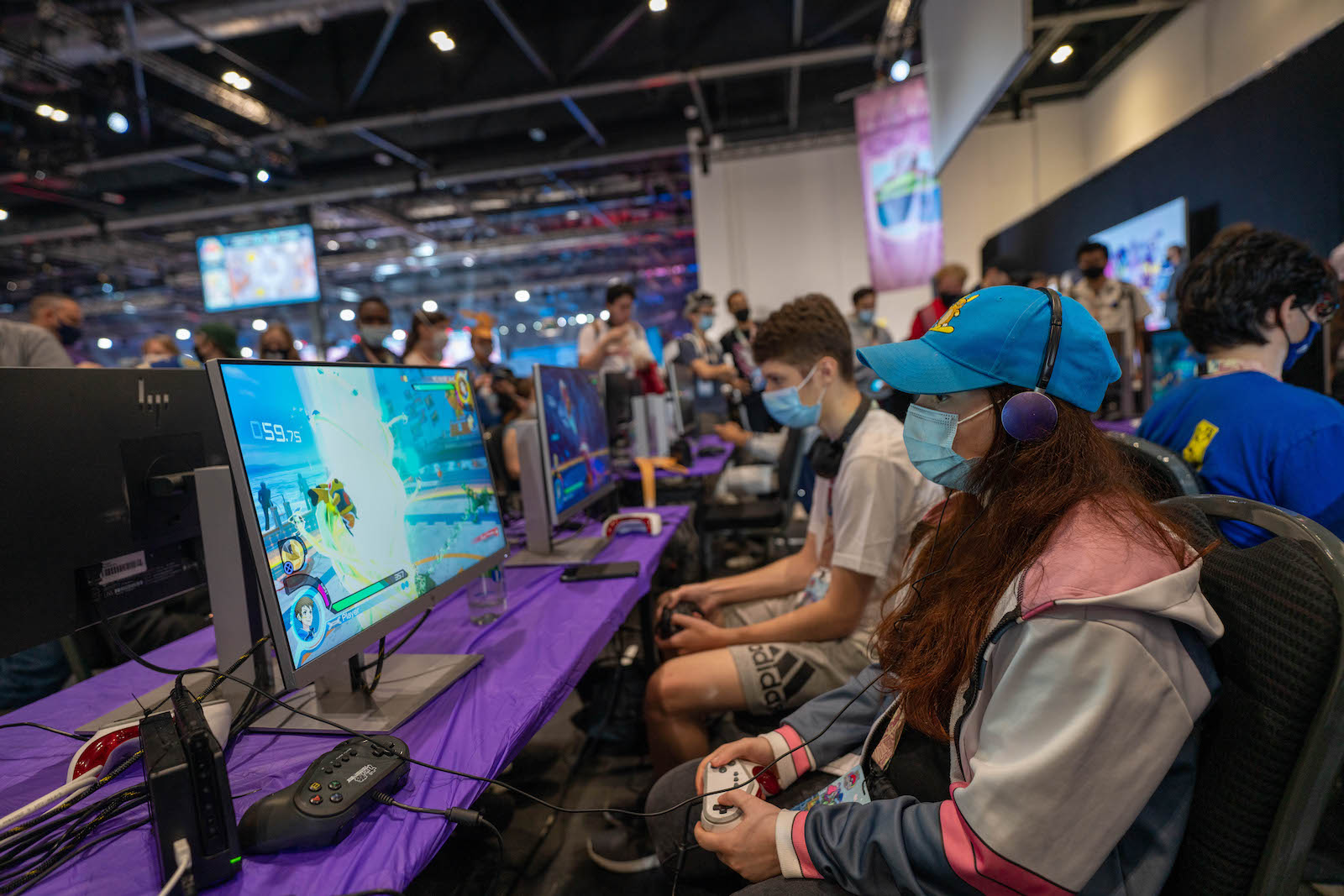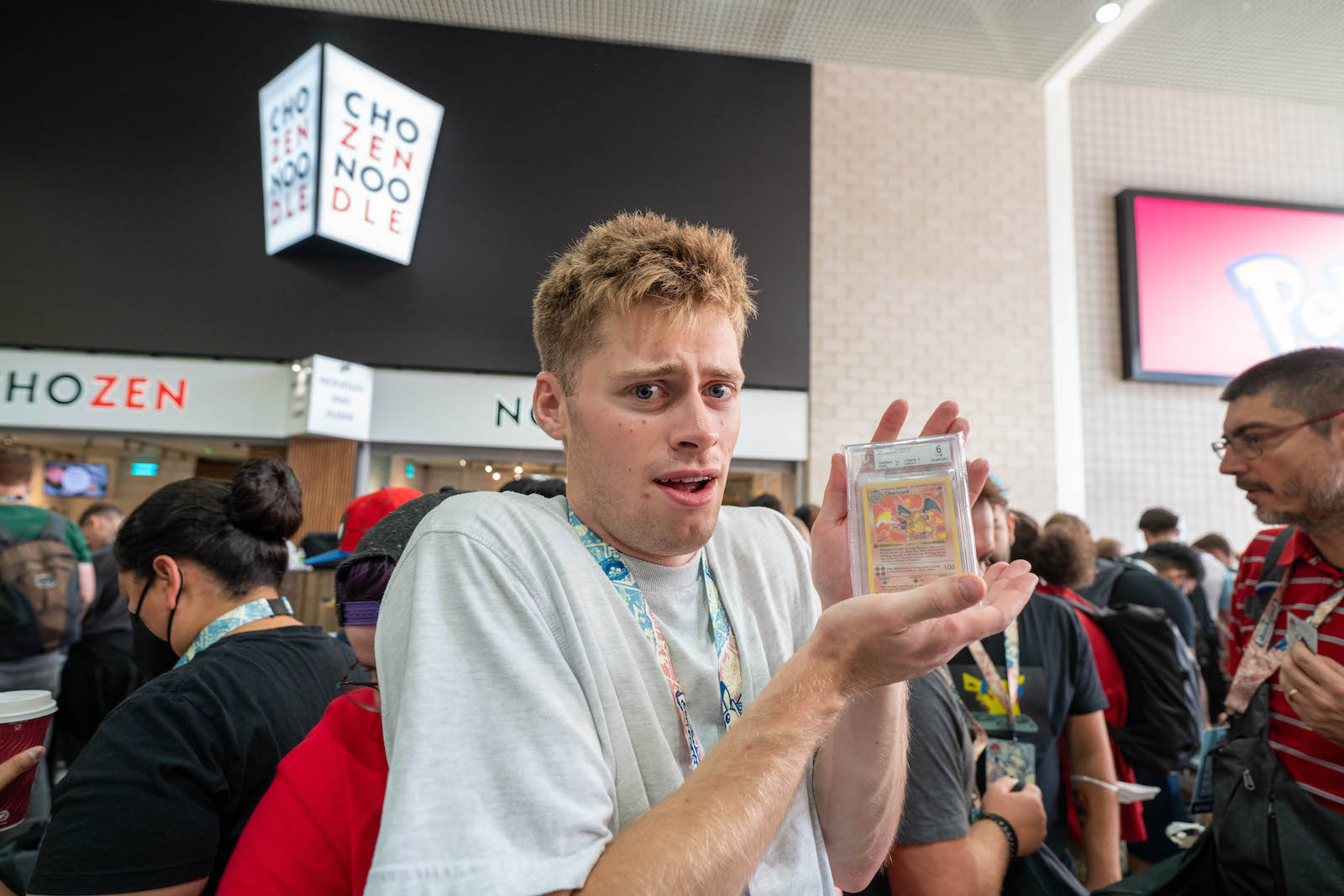The lights on the stage dim and the air throbs with low trap music. Thousands cheer in anticipation as commentators introduce the first competitor in today’s match, Kiara, from Australia, who will be facing off against Kosaku, from Japan. The two combatants enter the arena from red telephone boxes on the stage, doused in flashing strobes. Kiara, 10, sits at the desk in the middle of the stage, setting her good luck charm next to her: a plushie of her favourite Pokémon, Glaceon.
Despite the over-the-top pageantry, this isn’t a boxing match for children. I am in fact here to watch these two partake in an incredibly serious Pokémon battle, using the latest Nintendo Switch releases, Pokémon Sword and Pokémon Shield.
Videos by VICE
For the uninitiated, Pokémon battles involve players (AKA trainers) choosing a team of their favourite monsters, then facing off against each other using just four of them in a turn-based fight. Think of it like doubles tennis, except instead of people whacking balls at each other, you have cute virtual animals taking turns to smack each other with moves like ‘Behemoth Blade’ and ‘Flare Blitz’. There are whoops as Pokémon appear on the enormous screens suspended above the stage, and gasps as players land unexpected critical hits.
This isn’t my first rodeo. I’ve been here all weekend, watching fans of all ages and nationalities compete in card games, mobile games, and fighting games, as well as over who has the most and rarest merch. These are the Pokémon World Championships, the Glastonbury of the Pokécalender, finally being held in ExCeL London after two years of COVID disruption.

Sadly for Kiara, today’s match ends in defeat: Kosaku’s Gigantamax Blastoise (don’t ask) soundly swept his opponent’s team away, making him the world champion of the junior division. With the aid of a translator, a beaming Kosaku tells the crowd: “I’m insanely happy right now. I want to say hi to my dad who’s in the audience today, and who has watched all my matches until now.”
As the juniors exit the stage, two commentators pop up on the screens to discuss the abilities and moves of Kosaku’s team with the seriousness of Premier League pundits. The atmosphere is tense. Backstage, the next set of finalists are being fitted with grey-noise headphones to keep them focussed. Around me, spectators brandish flags and clutch various Pokémon plushies in bright, vivid colours.

I chat to 16-year-old Liam, who has just emerged as the Trading Card Game (TCG) senior division world champion. His family has flown all the way from Washington DC to be here – his parents have got in the habit of planning family holidays around their son’s competitions. “To be good at Pokémon it takes a lot of hard work and effort,” Liam says. “I’ve been playing for the last eight years – practising, testing and playing games for those eight years. I’ll play five days a week if there’s a tournament coming up.”
Over in the main hall, there are desks packed with trainers – both casual and competitive – playing TCG, Tekken crossover Pokkén (another Switch title) and Pokémon UNITE (a mobile game modelled after League of Legends).
On one desk, a particularly dextrous lad is prodding Pokémon Sword with one hand, and Pokémon GO on his phone with the other. Everyone’s decked out in visors and t-shirts. I’m almost surprised that there aren’t real Pokémon swishing about.


Luke, 23, from Plymouth, has been running tournaments in the UK for several years. By day he’s a software engineer. But in his free time he volunteers at events like these. Luke climbed through the ranks at local and regional gatherings and now bears the official title of “Pokemon Professor”. To be at the Worlds is the crown jewel.
“It’s the community aspect that’s so appealing,” he explains while doling out free packs of Pokémon cards, grinning as the boy next to him pulls a particularly rare one and immediately begins sleeving it with quivering hands. “I’ve made so many friends doing this. Interacting with players is really special. We have some families that play together but a lot of others won’t have met before. Everyone’s so friendly.”

Not everyone is here to compete or spectate. Outside the hall I come across a veritable market of trading card enthusiasts, binders of rare cards and TCG accessories spread out in front of them. While there is some card-for-card trading going on, many of these hustlers have bum bags and card readers, ready to cash in.
Sam, 29, has come from Liverpool, and runs a business collecting and selling rare cards. He left his job as a graphic designer to pursue collecting full-time. Gesturing to a Pikachu card in front of him, he coolly tells me it’s worth over £1,000. “I just enjoy Pokémon so much,” he says. “As a graphic designer I appreciate the artwork.”

PSA-graded cards can clearly sell for a hefty amount, though collectors have to pay for the card to be sent to America, where its legitimacy and condition are examined in forensic detail before it’s sent back in a perspex case. There are hundreds of these things fanned out on the tables around me, each worth more than the last. Scanning through another collector’s library, I spot a Charizard – the Charizard – and ask how much it’s worth. “£5,000,” he tells me.
But before I can say something lame about how that would pay for my houseshare’s entire predicted energy bill this year, I ask if I can hold it. I look around, wondering how many millions of pounds worth of trading cards would go up in smoke if there were a fire in just this square foot of floor space.

The Pokémon Company, who organise the tournament, don’t seem to mind these guys setting up shop on their doorstep, perhaps because the real money-spinner is just a few feet away. An official merch pop-up, aptly named ‘Pokémon Center’, has been open all weekend to members of the public (although its huge popularity necessitates advance appointments). It’s a shining example of why Pokémon has persisted since the 1990s, becoming the most profitable media franchise of all time.
Plushies, figurines, clothing and trading cards line the walls, while orchestral renditions of the games’ soundtracks play in the background. On my way in, I’m handed a Santa sack for all the goodies I might want to buy – and I clock dozens of fans who have already filled theirs with Pokégoods.
Some have taken a moment to sit on the floor with their sacks, perhaps wondering how much of their haul they can reasonably afford, and agonising over which of their favourites might have to be ditched. A bemused cashier tells me some have spent between £600 and £700 here, while others have even been asked to put merch back after violating the shop’s purchase limit.

In the pop-up, I meet couples who met and fell in love over their shared enjoyment of the franchise, families who’ve played together since the 90s and influencers who’ve earned a living playing the games or opening packs of cards online.
They all pale in comparison to Joe Merrick, however, arguably Pokémon’s ultimate superfan. Merrick, 36, runs Serebii.net from his home in Bournemouth, where he posts news updates for every game in the series, the anime and live coverage of events like these. He started the site 23 years ago, and continues to run it by himself. Once, he tells me, three million people visited Serebii in a single day, which is more than some major news outlets.
“I can spend between two and 24 hours a day upkeeping the site,” he explains. “When a new game comes out I play through it and type up every little detail – like where individual trainers and items are.”

I’m a pretty big Pokémon fan myself – it’s hard not to be, it’s been around for decades and the cartoons are cute – but after this weekend I feel like I need a break from Pikachu’s adorable face. Does Merrick ever get sick of it? “Not at all,” he says. “There have been a couple of times I’ve been down on the site, but that’s mainly down to internet culture. My most played game of all time is still Pokémon Sword.”
“Serebii is still growing, but it’s gonna stop at some point,” he adds. “For now, I’m happy where I am. I’ve had offers to sell it – but for me to do that it would have to be a really enticing offer. I’ve been running Serebii for 23 years and it’s like my child. I don’t want to let it go.”
My Pokénthusiam has been exhausted. I board the cable car from the ExCeL to Greenwich, feeling like I’m on a festival comedown and clutching a plushie of my own favourite Pokémon, Sceptile. The cars have all been Pokéfied with different types of monster, and the “Pallet Town” theme from the original GameBoy games has been chiming away at the station all weekend, which the staff cheerily inform me has long since driven them insane.

I was expecting a Pokémon event on this scale to be a nerdfest – and it absolutely was – but what Luke said about everyone being super friendly was also true. Total strangers patiently taught me how to play the card game, excitedly showed off their cosplay and warmly accepted me as one of their own. For a while at least, amid all the wholesomeness, it was easy to forget that there was a world outside of Pokémon.




